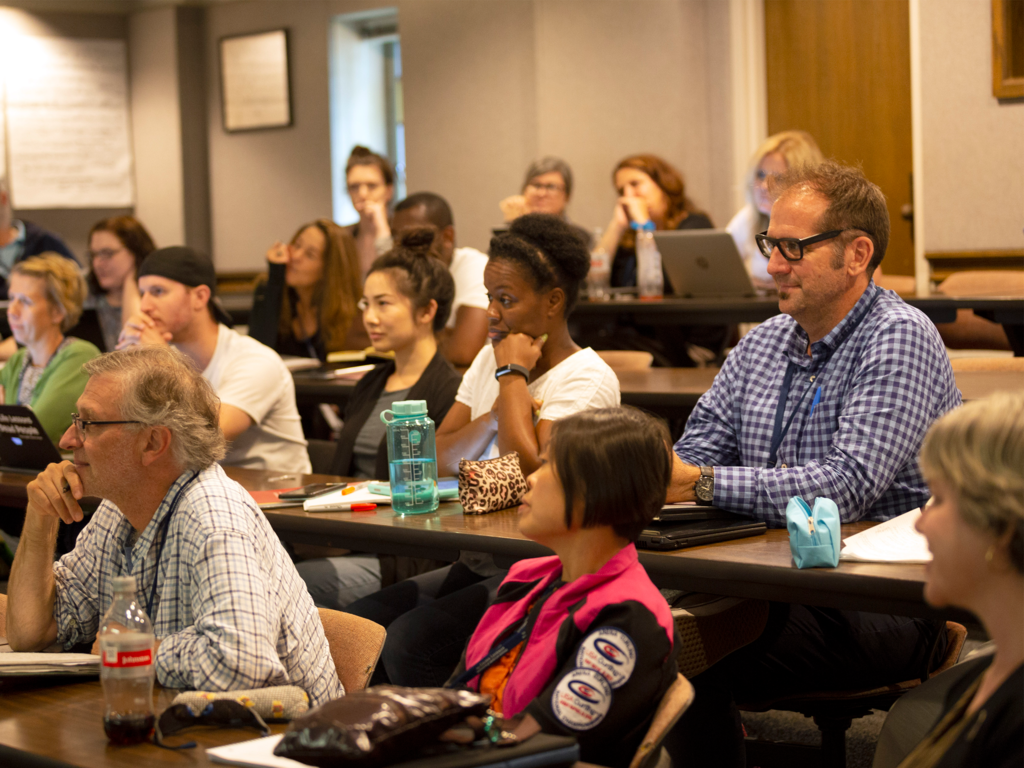When history teachers are trying to convey the past to a new generation of students, they often are met with the question, “What does this have to do with me?” Dr. Charles McKinney, the Neville Frierson Bryan Chair of Africana Studies and associate professor of history at Rhodes, says, “We’ve got to equip people to grapple with the complexities of history as well as the peril and prospects, the opportunities, and the contradictions that are all woven within the fabric of American history.”
McKinney is serving as lead scholar and providing the majority of academic content for the Gilder Lehrman Institute of American History’s Teacher Seminar: “The Civil Rights Movement” being held this week through July 14. This is the third summer Rhodes, in partnership with the National Civil Rights Museum, has hosted the seminar, in which more than 30 selected K-12 educators from the U.S. and abroad will have a weeklong program of professional development. Educators will attend lectures and discussions led by McKinney and other eminent historians, as well as visit local historic sites such as the Stax Museum of American Soul and Clayborn Temple to have access to primary sources. Rhodes is providing campus housing, and the teachers will attend most of the lectures in Buckman Hall on campus. “It is vitally important for us to provide as much content and enough historical context and background as possible for the teachers tasked with teaching our children.”
Founded in 1994, the Gilder Lehrman Institute is the leading American history nonprofit organization dedicated to K-12 education while also serving the general public. Annually, it presents teacher seminars at colleges and historic sites. Dr. Russell Wigginton, vice president of student life and dean of students, was instrumental in pitching the idea of a teacher seminar in Memphis, according to McKinney. “Memphis has a longstanding role in the Civil Rights Movement. We will discuss the origins of the movement and the role of women in the movement and in leadership. Obviously, we are going to talk about Dr. King and his multiple interactions with Memphis,” says McKinney. “But Memphis is more than April of 1968. The Civil Rights Movement is not simply about the relationship between black and white people. It’s about the ordering of society. It’s about questions related to the Constitution. It’s about questions related to the economy and the structure of the economy. It’s about questions related to environmental concerns . . . There is no institution in America that has not been affected by a civil rights struggle. History has meaning for everybody.”
Although McKinney now considers himself a Memphian, he grew up in California and attended Dos Pueblos High School, northwest of Santa Barbara, where learning history opened up a world of possibilities for him. Says McKinney, “I had a teacher named Mr. Ken Larson in high school, who transformed history from lists of dates and names into drama. He transformed it into what it is supposed to be, an exploration of the human condition. History came alive in Mr. Larson’s classes. I was a history major in college (Morehouse), and had even declared my major the third week of freshman year.”
McKinney went on to earn a master’s degree and doctorate in history from Duke University. He joined the Rhodes faculty in 2004. He teaches a variety of courses that focus on the African American experience in the United States, and his primary research interests include local movements from the ground up. “When we think about how to gain greater freedom, in many instances the answer to that question is to figure out what is working in the status quo politically, economically, and culturally, and how do we change the things that aren’t working. How do we speak in a new language that people can understand about the things in our society that are not working, that are actively hurting people? How do we have that conversation?”
McKinney adds that teaching and studying history is about having those conversations, and that the field of history is important in so many ways. “We have history majors who have gone on to medical school and into politics. They have become historians and teachers. They go to divinity school or business school and even become financial consultants. They are all over the place, doing all kinds of things.”
Hopefully, he says, participants of the Gilder Lehrman Teacher Seminar in Memphis will receive the kinds of information that will inspire another generation of history scholars.
